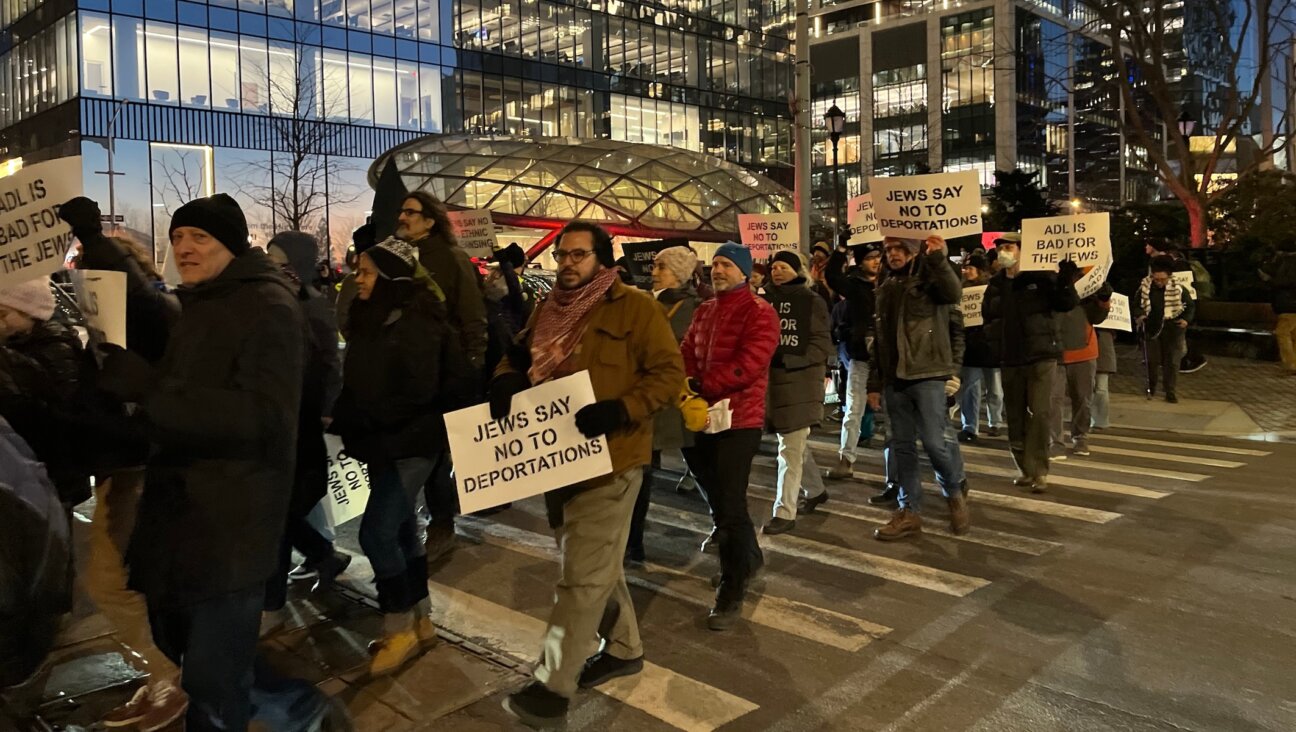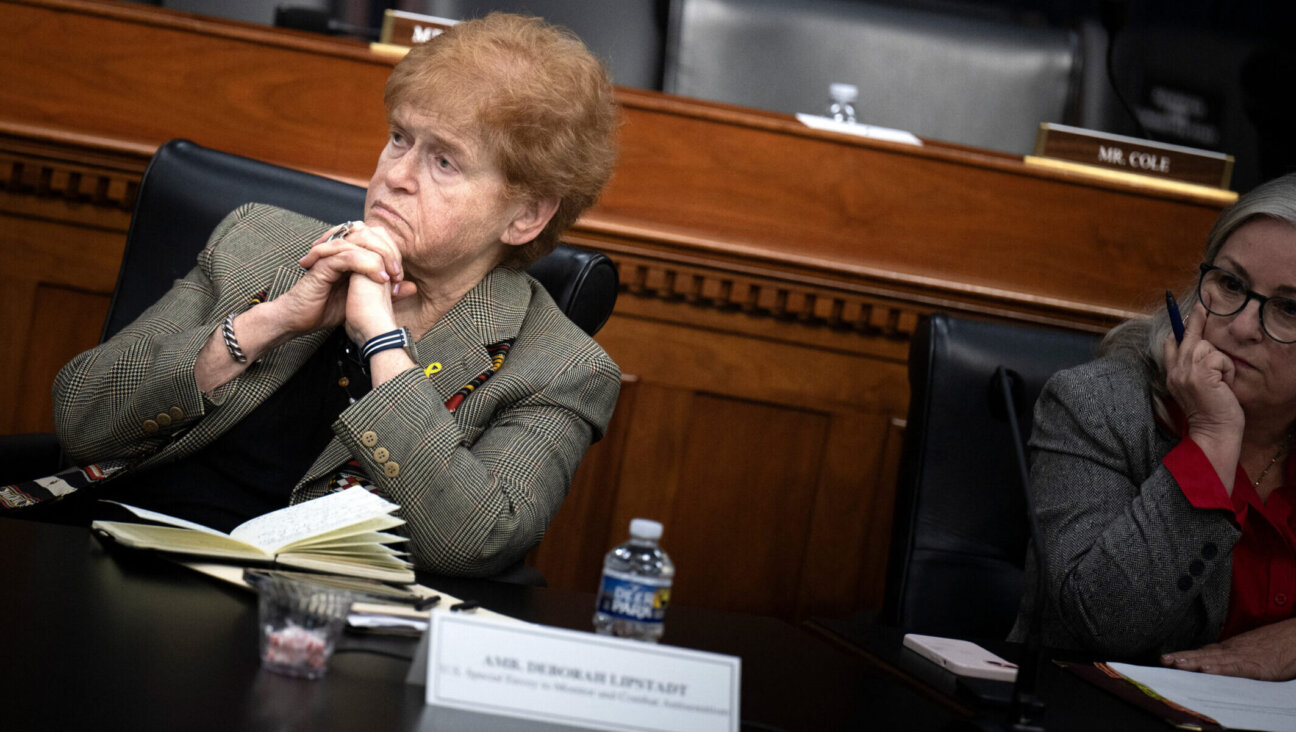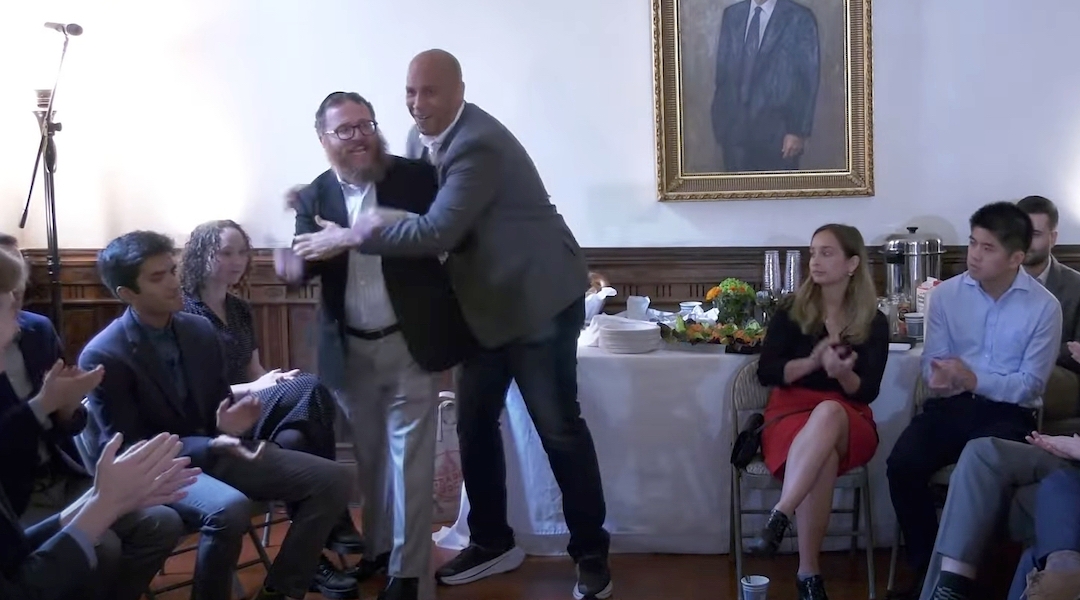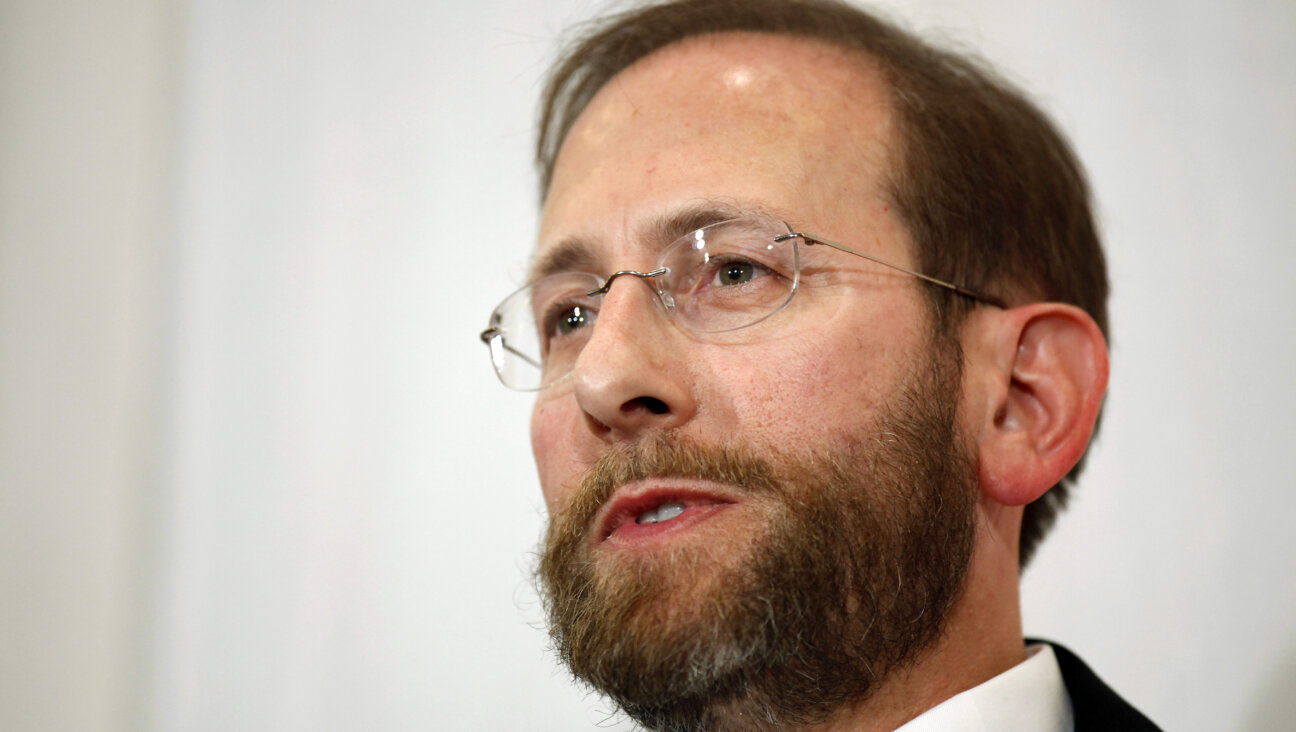Critics Slam Rabbi, Y.U. Over Article on Gentiles
An article in a student publication of Yeshiva University’s affiliated rabbinical seminary that suggests the basis for the religious prohibition against murder is different for Jews and non-Jews is causing a stir in the Modern Orthodox world.
The article quotes classical Jewish texts to support the argument that while the Bible contains a prohibition against killing Jews, the law forbidding a Jew to kill a non-Jew is a rabbinic injunction. The distinction, some observers said, could be read to imply a difference in the value of Jewish and gentile life.
The article, which mixes Hebrew and Aramaic while dealing generally with the seven Noachide laws, the rules governing the behavior of all peoples, cites a rabbinic opinion that non-Jews who perform abortions are committing murder. The author, Rabbi Daniel Stein, 27, is a student of Kollel Elyon, a highly respected post-rabbinical program at the Y.U.-affiliated Rabbi Isaac Elchanan Theological Seminary, which publishes the student-edited Beit Yitzchak journal, where the article appeared.
Administrators at Y.U. said that Stein was merely engaging in a theoretical halachic exercise about laws relevant to the Temple period millennia ago that have no practical application to the present day. Nevertheless, the article, first publicized on the Web site protocols.blogspot.com, has sparked a larger debate in the Orthodox world over how to present esoteric texts that may be misinterpreted or misused outside of a yeshiva study hall.
Neither the author nor the article’s critics has suggested that the article was an attempt to justify the murder of non-Jews by Jews. But critics, including theologian Rabbi Irving “Yitz” Greenberg, are disturbed by what they see as a lack of sensitivity on the part of the Y.U. community to the way non-Jews — or for that matter, Jewish extremists in Israel — may view articles of this type.
Stein, who has been studying at the seminary for six years, declined to comment.
The debate over the Beit Yitzchak article comes in the wake of a much larger debate over the use of rabbinic texts dealing with Jews and non-Jews. Rabbi Saadya Grama, an alumnus of the renowned ultra-Orthodox yeshiva in Lakewood, N.J., recently caused an uproar by publishing a book that attempts to employ rabbinic sources to support his race-based theory of Jewish supremacy.
Y.U. administrators and critics of Stein’s article agreed that it should not be lumped together with Grama’s book. But the Grama scandal has served as a lightning rod for disputes over the use of controversial rabbinic exegeses. If not for the Lakewood scandal, the Beit Yitzchak article would not have come under scrutiny, said Rabbi Norman Lamm, the chancellor of Y.U. and the rosh yeshiva of its affiliated seminary.
Lamm, who last month blasted Grama’s book, told the Forward that only a minority of commentators in the rabbinic canon believed that a distinction could be made regarding the killing of Jews and non-Jews, and that such a view is not generally accepted. Lamm added: “Had the author had more experience, he would’ve made sure to say the great majority of authorities are against this.” According to more common opinions, Lamm said, “If a Jew should murder a non-Jew he would be punished in the same way as if he murdered a Jew.” Lamm said that in the future, the student-edited journal must be scrutinized closely by an expert sensitive to such delicate issues.
Lamm, however, stopped short of condemning the article. Instead, he said, Stein had made an “innocent mistake” by failing to provide proper context. “He was writing for a scholarly audience that knows how to discriminate between a hypothetical projection and authoritative law.”
“To focus on this one piece is simply raising a yellow flag when there’s nothing to raise,” said Lamm.
But the author’s and editors’ assumptions about their audience is precisely the problem, according to critics.
“They’re living in a bubble,” said Greenberg, a former professor at Y.U. who has frequently clashed with many of the seminary’s top rabbis.
“When this thing slips through, it’s a sign that there is excessive insularity and lack of awareness of the fullness of humanity of gentiles and how they hear or feel about such text,” said Greenberg, a past chair of the U.S. Holocaust Memorial Museum. “The leadership of the kollel has failed to correct this atmosphere among its students.”
Rabbi Eugene Korn, who recently stepped down as director of interfaith affairs at the Anti-Defamation League, said: “Unfortunately, the author does not make explicit the theoretical nature of the discussion.”
The editor of The Edah Journal: A Forum of Modern Orthodox Discourse, Korn said that antisemites and Jewish extremists both distort talmudic sources for their own ends. “It is essential that people who quote Jewish law — even theoretically — are careful not to play into the hands of people who will use it for vicious purposes,” Korn said.
The Beit Yitzchak journal is no stranger to controversy. Several years ago, a student caused a ruckus by referring to a leader in the Conservative movement with an honorific reserved only for the most respected rabbinic leaders.
In Stein’s article, he quotes various revered commentators to support his case. Among those cited are modern halachic giants based in Israel, including an interpretation by the late Rabbi Shlomo Zalman Auerbach, who headed Yeshiva Kol Torah, and a direct quote from Rabbi Ovadia Yosef, spiritual leader of the Israeli Shas party and the former Sephardic chief rabbi.
According to close readings by several rabbinic scholars, Stein’s article cites numerous sources to prove that the biblical prohibition against murder — punishable by death in the Temple period — applies to Jews only if they perform direct murderous action. But the article argues that the biblical prohibition applies to non-Jews even if their actions are indirectly but purposefully responsible for a death, a category in biblical law that includes people who perform abortion. Several scholars contacted by the Forward said that contemporary Jewish law does not make distinctions between rabbinic law and biblical law.
Greenberg acknowledged that Stein was probably arguing a theoretical point, but said the article must be “exposed and criticized” because of the “implicit danger in un-repudiated words that someone may come along one day and act on them.” Greenberg pointed to Yigal Amir, the Israeli student who said that he was acting on theoretical comments made by his teachers when he assassinated the late Israeli prime minister Yitzhak Rabin.
Greenberg took particular exception to the article’s focus on sources that argue that non-Jews who abort fetuses are committing murder. “As I recall, we had an incident recently where an Evangelical Christian shot a Jewish abortion doctor after hearing the same message repeated, that abortion-performers are murderers.”
Greenberg’s criticism of the statement in the article about abortion wades into murkier territory, insofar as Stein based his argument on a quote from a rabbinic opinion by the widely respected 12th-century commentator Moses Maimonides, among others. While some theologians argue that the Modern Orthodox community should push such views to the sides, other scholars are concerned by what they describe as censorship and where it might end.
Rabbi Yosef Blau, spiritual counselor to students at Y.U., said that it was “absurd” to criticize an accurate citation of an authoritative rabbinic source. “If someone wants to argue that no analysis can be done of rabbinic texts that if applied today could be problematic, that would be a restriction on the ability of anyone to analyze early texts,” Blau said.
That said, Blau argued that Stein misinterpreted rabbinic sources when he stated that a distinction existed between the rules forbidding the murder of Jews and non-Jews. But Blau disagreed with those who argued that the article could be misused: “Someone who wants to know Halacha is not going to look at half a page in an article in a student publication for what to do.”
The dean of the seminary, Rabbi Zevulun Charlop, insisted that “in Judaism, according to the Torah, there is no distinction between saving the life of a gentile and saving the life of a Jew.” Charlop once wrote an article in Beit Yitzchak asserting that a non-Jew can reach the “highest pinnacle of religious perfection.”
“Did we do something bad and didn’t see it?” Charlop said, referring to the publication of Stein’s article. “It’s not that. We just have to be more sensitive than we think we are.”
The Forward is free to read, but it isn’t free to produce

I hope you appreciated this article. Before you go, I’d like to ask you to please support the Forward.
Now more than ever, American Jews need independent news they can trust, with reporting driven by truth, not ideology. We serve you, not any ideological agenda.
At a time when other newsrooms are closing or cutting back, the Forward has removed its paywall and invested additional resources to report on the ground from Israel and around the U.S. on the impact of the war, rising antisemitism and polarized discourse.
This is a great time to support independent Jewish journalism you rely on. Make a gift today!
— Rachel Fishman Feddersen, Publisher and CEO
Support our mission to tell the Jewish story fully and fairly.
Most Popular
- 1

Opinion The dangerous Nazi legend behind Trump’s ruthless grab for power
- 2

Opinion A Holocaust perpetrator was just celebrated on US soil. I think I know why no one objected.
- 3

Culture Did this Jewish literary titan have the right idea about Harry Potter and J.K. Rowling after all?
- 4

Opinion I first met Netanyahu in 1988. Here’s how he became the most destructive leader in Israel’s history.
In Case You Missed It
-

Fast Forward Trump administration restores student visas, but impact on pro-Palestinian protesters is unclear
-

Fast Forward Deborah Lipstadt says Trump’s campus antisemitism crackdown has ‘gone way too far’
-

Fast Forward 5 Jewish senators accuse Trump of using antisemitism as ‘guise’ to attack universities
-

Fast Forward Jewish Democratic Rep. Jan Schakowsky reportedly to retire after 26 years in office
-
Shop the Forward Store
100% of profits support our journalism
Republish This Story
Please read before republishing
We’re happy to make this story available to republish for free, unless it originated with JTA, Haaretz or another publication (as indicated on the article) and as long as you follow our guidelines.
You must comply with the following:
- Credit the Forward
- Retain our pixel
- Preserve our canonical link in Google search
- Add a noindex tag in Google search
See our full guidelines for more information, and this guide for detail about canonical URLs.
To republish, copy the HTML by clicking on the yellow button to the right; it includes our tracking pixel, all paragraph styles and hyperlinks, the author byline and credit to the Forward. It does not include images; to avoid copyright violations, you must add them manually, following our guidelines. Please email us at [email protected], subject line “republish,” with any questions or to let us know what stories you’re picking up.















